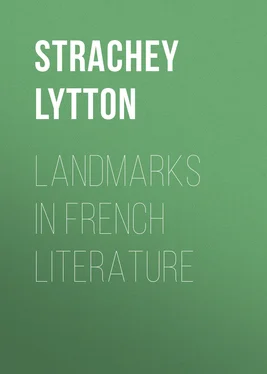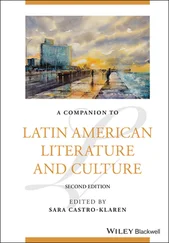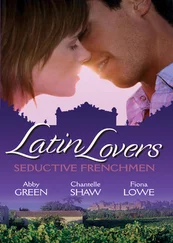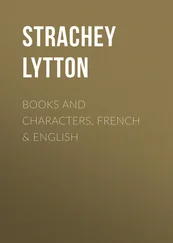Lytton Strachey - Landmarks in French Literature
Здесь есть возможность читать онлайн «Lytton Strachey - Landmarks in French Literature» — ознакомительный отрывок электронной книги совершенно бесплатно, а после прочтения отрывка купить полную версию. В некоторых случаях можно слушать аудио, скачать через торрент в формате fb2 и присутствует краткое содержание. Жанр: Языкознание, foreign_antique, foreign_prose, Зарубежные любовные романы, на английском языке. Описание произведения, (предисловие) а так же отзывы посетителей доступны на портале библиотеки ЛибКат.
- Название:Landmarks in French Literature
- Автор:
- Жанр:
- Год:неизвестен
- ISBN:нет данных
- Рейтинг книги:4 / 5. Голосов: 1
-
Избранное:Добавить в избранное
- Отзывы:
-
Ваша оценка:
- 80
- 1
- 2
- 3
- 4
- 5
Landmarks in French Literature: краткое содержание, описание и аннотация
Предлагаем к чтению аннотацию, описание, краткое содержание или предисловие (зависит от того, что написал сам автор книги «Landmarks in French Literature»). Если вы не нашли необходимую информацию о книге — напишите в комментариях, мы постараемся отыскать её.
Landmarks in French Literature — читать онлайн ознакомительный отрывок
Ниже представлен текст книги, разбитый по страницам. Система сохранения места последней прочитанной страницы, позволяет с удобством читать онлайн бесплатно книгу «Landmarks in French Literature», без необходимости каждый раз заново искать на чём Вы остановились. Поставьте закладку, и сможете в любой момент перейти на страницу, на которой закончили чтение.
Интервал:
Закладка:
The new artistic views of the age first appeared, as was natural, in the domain of poetry. The change was one towards consciousness and deliberate, self-critical effort. The medieval poets had sung with beauty; but that was not enough for the poets of the Renaissance: they determined to sing not only with beauty, but with care. The movement began in the verse of MAROT, whose clear, civilized, worldly poetry shows for the first time that tendency to select and to refine, that love of ease and sincerity, and that endeavour to say nothing that is not said well, which were to become the fundamental characteristics of all that was best in French poetry for the next three hundred years. In such an exquisite little work of art as his epistle in three-syllabled verse—'À une Damoyselle Malade', beginning—
Ma mignonne,
Je vous donne
Le bonjour,
we already have, in all its completeness, that tone of mingled distinction, gaiety and grace which is one of the unique products of the mature poetical genius of France. But Marot's gift was not wide enough for the voluminous energies of the age; and it was not until a generation later, in the work of the Pléiade —a group of writers of whom RONSARD was the chief, and who flourished about the middle of the sixteenth century—that the poetical spirit of the French Renaissance found its full expression.
The mere fact that the Pléiade formed a definite school, with common principles and a fixed poetical creed, differentiates them in a striking way from the poets who had preceded them. They worked with no casual purpose, no merely professional art, but with a high sense of the glory of their calling and a noble determination to give to the Muses whom they worshipped only of their best. They boldly asserted—in Du Bellay's admirable essay, La Défense et Illustration de la Langue Française —the right of the French language to stand beside those of the ancients, as a means of poetical expression; and they devoted their lives to the proof of their doctrine. But their respect for their own tongue by no means implied a neglect of the Classics. On the contrary, they shared to the full the adoration of their contemporaries for the learning and the literature of the Ancient World. They were scholars as well as poets; and their great object was to create a tradition in the poetry of France which should bring it into accord with the immortal models of Greece and Rome. This desire to imitate classical literature led to two results. In the first place, it led to the invention of a great number of new poetical forms, and the abandonment of the old narrow and complicated conventions which had dominated the poetry of the Middle Ages. With the free and ample forms of the Classics before them, Ronsard and his school enfranchised French verse. Their technical ability was very great; and it is hardly too much to say that the result of their efforts was the creation of something hitherto lacking in French literature—a poetical instrument which, in its strength, its freedom, its variety of metrical resources, and its artistic finish, was really adequate to fulfil the highest demands of genius. In this direction their most important single achievement was their elevation of the 'Alexandrine' verse—the great twelve-syllabled rhyming couplet—to that place of undisputed superiority over all other metres which it has ever since held in French poetry.
But the Pléiade's respect for classical models led to another and a far less fortunate result. They allowed their erudition to impinge upon their poetry, and, in their eagerness to echo the voice of antiquity, they too often failed to realize the true bent either of their own language or their own powers. This is especially obvious in the longer poems of Ronsard—his Odes and his Françiade —where all the effort and skill of the poet have not been enough to save his verse from tedium and inflation. The Classics swam into the ken of these early discoverers in such a blaze of glory that their eyes were dazzled and their feet misled. It was owing to their very eagerness to imitate their great models exactly—to 'ape the outward form of majesty'—that they failed to realize the true inward spirit of Classical Art.
It is in their shorter poems—when the stress of classical imitation is forgotten in the ebullition of individual genius—that Ronsard and his followers really come to their own. These beautiful lyrics possess the freshness and charm of some clear April morning, with its delicate flowers and its carolling birds. It is the voice of youth that sings in light and varied measures, composed with such an exquisite happiness, such an unlaboured art. The songs are of Love and of Nature, of roses, skylarks and kisses, of blue skies and natural joys. Sometimes there is a sadder note; and the tender music reminds us of the ending of pleasures and the hurrying steps of Time. But with what a different accent from that of the dark and relentless Villon! These gentle singers had no words for such brutalities.
Quand vous serez bien vieille, au soir, à la chandelle—
so Ronsard addresses his mistress; and the image is a charming one of quiet and refined old age, with its half-smiling memories of vanished loves. What had become, in the hands of Villon, a subject for grim jests and horrible descriptions, gave to Ronsard simply an opportunity for the delicate pathos of regret. Then again the note changes, and the pure, tense passion of Louise Labé—
Oh! si j'étais en ce beau sein ravie
De celui-là pour lequel vais mourant—
falls upon our ears. And then, in the great sonnet sequence of Du Bellay— Les Antiquités de Rome —we hear a splendid sound unknown before in French poetry—the sonorous boom of proud and pompous verse.
Contemporary with the poetry of the Pléiade , the influence of the Renaissance spirit upon French literature appeared with even more striking force in the prose of RABELAIS. The great achievement of the Pléiade had been the establishment, once and for all, of the doctrine that literature was something essentially artistic; it was Rabelais who showed that it possessed another quality—that it was a mighty instrument of thought. The intellectual effort of the Middle Ages had very rarely clothed itself in an artistic literary form. Men laughed or wept in the poetry or prose of their own tongue; but they thought in scholastic Latin. The work of Jean de Meung was an exception; but, even there, the poetical form was rough and feeble; the artistic and the intellectual principles had not coalesced. The union was accomplished by Rabelais. Far outstripping Jean de Meung in the comprehensiveness and vigour of his thought, he at the same time infinitely surpassed him as an artist. At first sight, indeed, his great book hardly conveys such an impression; to a careless reader it might appear to be simply the work of a buffoon or a madman. But such a conception of it would be totally mistaken. The more closely one examines it, the more forcibly one must be struck alike by its immense powers of intellect and its consummate literary ability. The whole vast spirit of the Renaissance is gathered within its pages: the tremendous vitality, the enormous erudition, the dazzling optimism, the courage, the inventiveness, the humanity, of that extraordinary age. And these qualities are conveyed to us, not by some mere conscientious pedant, or some clumsy enthusiast, but by a born writer—a man whose whole being was fixed and concentrated in an astonishing command of words. It is in the multitude of his words that the fertility of Rabelais' spirit most obviously shows itself. His book is an orgy of words; they pour out helter-skelter, wildly, into swirling sentences and huge catalogues that, in serried columns, overflow the page. Not quite wildly, though; for, amid all the rush and bluster, there is a powerful underlying art. The rhythms of this extraordinary prose are long and complex, but they exist; and they are controlled with the absolute skill of a master.
Читать дальшеИнтервал:
Закладка:
Похожие книги на «Landmarks in French Literature»
Представляем Вашему вниманию похожие книги на «Landmarks in French Literature» списком для выбора. Мы отобрали схожую по названию и смыслу литературу в надежде предоставить читателям больше вариантов отыскать новые, интересные, ещё непрочитанные произведения.
Обсуждение, отзывы о книге «Landmarks in French Literature» и просто собственные мнения читателей. Оставьте ваши комментарии, напишите, что Вы думаете о произведении, его смысле или главных героях. Укажите что конкретно понравилось, а что нет, и почему Вы так считаете.












